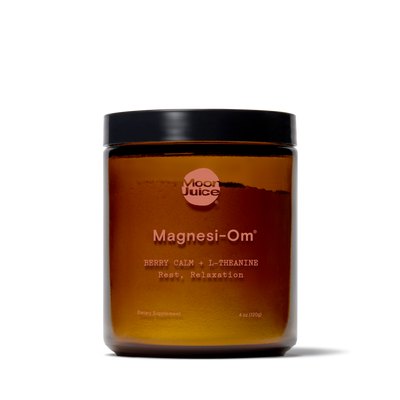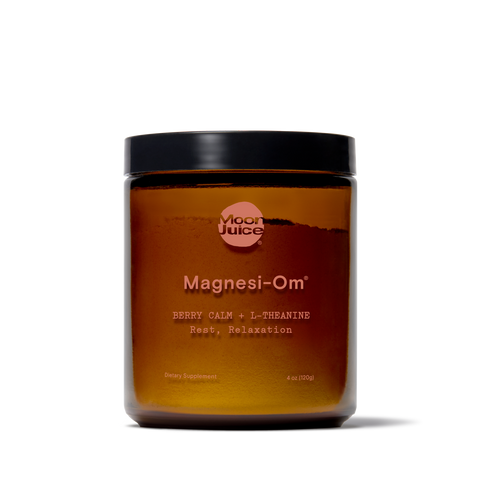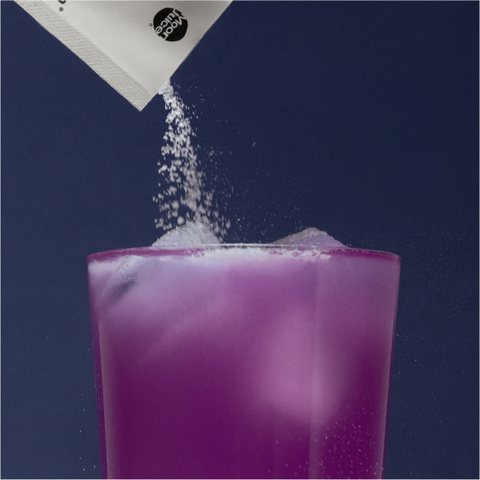Stress is all too common in this day and age, but it doesn’t have to be inevitable. Fortunately, there are countless tricks and tools at your disposal to keep calm and carry on. These include but aren’t limited to moving your body regularly, practicing self-care, and boosting your diet to manage your mood, mental health, and overall well-being. On the dietary front, nourishing yourself with diverse whole foods and knowing how to stay hydrated can certainly make a dent in how good you feel day in and day out. So, too, you can complement your food and beverage intake with the right dietary supplements. Ashwagandha and Magnesium are two such supplements that support stress reduction, better sleep, and wellness — albeit in different ways. That said, is one superior to the other?
Keep reading to learn more about the differences between Ashwagandha vs. Magnesium. Ahead, you’ll find what each is exactly, their unique benefits, and if you can (and should) take the two dietary supplements together.
What Is Ashwagandha?
Also known as Withania somnifera, Ashwagandha is arguably the most important herb in Ayurvedic medicine. This evergreen shrub — which is native to India, Africa, and specific corners of the Middle East — has been used for thousands of years to bring balance and harmony to the mind and body.
Packed with antioxidants and other bioactive compounds, the benefits of Ashwagandha include less stress, better sleep, and is also one of the best natural remedies to improve brain fog and boost mental health.
What Is Magnesium?
Magnesium isn’t any old micronutrient; it’s among the most abundant and influential minerals in the human body. This element is necessary as a cofactor for 300+ enzymatic reactions, hence supporting and facilitating countless biochemical functions.
While its duties are too numerous to name, some of its key roles are to help build proteins and strong bones, assist muscle and nerve functions, and regulate blood sugar. On the mind and mood fronts, Magnesium boasts brain health benefits, helps you relax, and enhances sleep quality.
Note: As important as it is, an estimated half of the US population — as well as two-thirds of the Western world — suffer from a Magnesium deficiency. Unfortunately, soil depletion and water demineralization have made it more difficult to get Magnesium through our daily diets compared to yesteryear. In addition, certain types of Magnesium are less bioavailable than others. For these reasons, it could be a good idea to not only enrich your diet with Magnesium-rich foods but also take a Magnesium supplement.
Comparing Ashwagandha and Magnesium
Benefits
Among its key benefits, Ashwagandha is known to:
- Help regulate cortisol (aka the stress hormone)
- Reduce stress
- Stave off mood imbalances such as mood swings and irritability
- Improve sleep quality
The benefits of Magnesium are wide-ranging. That said, some of its most important roles include:
- Regulating the nervous system
- Supporting brain health (spanning cognition, memory, and protecting against cognitive decline)
- Relieving muscle cramps
- Helping you poop
- Alleviating headaches
- Aiding sleep
Side Effects
Per the National Institutes of Health (NIH), studies and clinical trials suggest that Ashwagandha root extract use is generally well-tolerated for up to 3 months of use. (More research is needed to decipher if longer-term Ashwagandha supplementation is safe and sound.) They cite mild potential side effects such as:
- Stomach upset
- Loose stools
- Nausea
- Drowsiness
The NIH also explains that Magnesium intake through foods doesn’t typically instigate risks in healthy individuals since your kidneys expel any excess through urination. Excess intake through Magnesium supplementation, however, may contribute to side effects such as:
- Diarrhea
- Nausea
- Abdominal cramps
On this point, it’s worth noting that some forms of Magnesium are easier to digest than others. Certain types — including Magnesium Citrate, Magnesium Oxide, Magnesium Gluconate, and Magnesium Lactate, — are specifically known to increase regularity and can potentially lead to upset stomachs for individuals with gut sensitivities.
Ashwagandha vs. Magnesium for Stress
Ashwagandha and Magnesium are often named together in terms of helping with stress reduction. However, they work in different ways to promote calm and relaxation.
Clinical evidence shows that Ashwagandha supplementation can directly lower cortisol levels and thus reduce stress. For instance, a randomized, double-blind, placebo-controlled study published in the Indian Journal of Psychological Medicine looked into the effects of twice-daily 300 mg Ashwagandha root extract supplementation in chronically stressed individuals. At the end of the 60-day study, participants in the Ashwagandha (vs. placebo) group benefited from:
- Significantly reduced serum cortisol levels
- Significantly lower scores on all stress-assessment scales
Magnesium supplementation, on the other hand, aids stress management due to its broader impact on the nervous system and its role in regulating neurotransmitters. Moreover, Magnesium status and stress are closely intertwined — and this pendulum could swing either way.
According to the National Library of Medicine, low Magnesium levels can lead to symptoms of stress such as fatigue, photosensitive headache, and physical manifestations of stress. In addition, the inability to manage stress well can actually deplete your body’s own Magnesium stores as the mineral escapes cell walls as a defensive mechanism.
But it’s not all doom and gloom. By knowing how to test for low Magnesium and staying on top of your Magnesium status, you’ll be better able to handle stressors that come your way. Magnesium helps maintain cellular balance and function — so normal, healthy amounts of the essential mineral can promote a healthier response to stress, greater feelings of calm and relaxation, and enhanced well-being on the whole.
In short, Ashwagandha’s ability to lower cortisol levels leads to its unstressing prowess. Meanwhile, Magnesium more broadly aids stress relief and management, given its influence on cellular health, nervous system regulation, and permitting your body to function as it should.
Ashwagandha vs. Magnesium for Sleep
Ashwagandha and Magnesium also benefit your sleep.
When you’re stressed, you’re less likely to achieve restful ZZZ’s. Thus, it’s not surprising that since Ashwagandha reduces stress, it can also improve your sleep.
One randomized, double-blind, placebo-controlled study published in the journal Cureus looked into the effects of twice-daily 300 mg Ashwagandha root supplementation in participants with both insomnia and moderate anxiety levels. Researchers evaluated progress at 5- and 10-week check-in points, noting that individuals in the Ashwagandha supplement (vs. placebo) group exhibited:
- Improvements in sleep quality
- Improvements in sleep onset latency (i.e., how long it takes to fall asleep)
- Improvements in sleep efficiency
- Better scores on stress-testing scales
The researchers concluded that taking an Ashwagandha supplement can be a safe and holistic way to improve sleep parameters in adults with insomnia and anxiety.
In the faceoff between Ashwagandha vs. Magnesium, the latter is also beneficial for sleep. (More specifically, Magnesium Citrate for sleep is a common antidote for sleepless nights.) Generally speaking, Magnesium promotes a good night’s rest by helping your mind and body relax by the time you’re ready to hit the hay. Remember: Magnesium is crucial to both regulate your nervous system (read: keep you calm, steady, and grounded) and help your muscles relax (thus alleviating physical tension before bed).
Published in the journal Biological Trace Element Research, a 2023 systematic review — which included 9 studies and 7,500+ participants — found positive links between adequate Magnesium and sleep quality. Specific sleep-friendly perks included benefits for:
- Falling asleep
- Length of sleep
- Perceptions of sleepiness
- Snoring
In sum, both Ashwagandha and Magnesium supplements have the ability to help you fall asleep faster and promote overall sleep quality.

Can You Take Magnesium and Ashwagandha Together?
It’s generally safe to take Magnesium and Ashwagandha together. Many of us would be all the wiser to prioritize getting enough Magnesium daily — not only to improve sleep and stress but also to promote general well-being. Ashwagandha, too, is one of the best adaptogens for stress relief and relaxation.
That said, it’s important to consult a trusted health professional — such as a physician or a dietitian — before adding dietary supplements to your routine. This is even more crucial if you’re managing medical conditions and/or taking medications.
Which Is Best For You?
Factors to Consider
Can’t decide between Ashwagandha vs. Magnesium? Although you can take Ashwagandha and Magnesium supplements together, perhaps you want to start off with one and see how you fare before adding (or replacing) the other in your routine.
Before taking either of these supplements, you may want to consider:
- Your current Magnesium status (whether through labs or evaluating your diet to see if you’re eating enough Magnesium-rich foods)
- If your cortisol levels are consistently high (which your doctor can test)
- How well you can tolerate Magnesium (especially if you have a history of digestive distress)
When to Choose Ashwagandha Ashwagandha may be your best bet if your cortisol levels are spiked day in and day out. Ashwagandha is specifically beneficial to help lower your cortisol levels, thus keeping stress at bay. It also shows promise to help individuals struggling with insomnia and anxiety. (Note: Since both of these conditions are chronic, it’s wise to consult your physician to discover — and safely address — their root causes.)
When to Choose Magnesium
You may want to opt for Magnesium over Ashwagandha if:
- You know you don’t get enough Magnesium in your diet or are already suffering from a Magnesium deficiency
- You want wider-ranging support for your muscles, headaches, digestion, brain health, and overall well-being
Should you decide to supplement with Magnesium over Ashwagandha, be sure to find a natural Magnesium powder with bioavailable forms of the mineral tailored to your specific needs. Magnesi-Om® offers:
- 3 highly bioavailable and easily absorbable chelated forms of Magnesium (Gluconate, Acetyl Taurinate, and Citrate) that support relaxation, brain health, and sleep*
- L-Theanine, an amino acid that promotes alpha-wave activity in the brain and supports healthy cognitive aging*
Magnesi-Om® is meditation you can sip. Mix 1 tsp in water nightly or whenever you need to chill. With consistent use, you’ll feel the stress melt away and kiss cramps, digestive distress, and PMS symptoms goodbye.
Sources
- NIH. Ashwagandha. https://www.nccih.nih.gov/health/ashwagandha
- PubMed. The Importance of Magnesium in Clinical Healthcare. https://pubmed.ncbi.nlm.nih.gov/29093983/
- Oregon State University. Micronutrient Inadequacies in the US Population: an Overview. https://lpi.oregonstate.edu/mic/micronutrient-inadequacies/overview
- PubMed Central. Cortisol as a Biomarker of Mental Disorder Severity. https://www.ncbi.nlm.nih.gov/pmc/articles/PMC8584322/
- OSF Healthcare. What are the health benefits of magnesium? https://www.osfhealthcare.org/blog/what-are-the-health-benefits-of-magnesium/
- NIH. Ashwagandha: Is it helpful for stress, anxiety, or sleep? https://ods.od.nih.gov/factsheets/Ashwagandha-HealthProfessional/
- NIH. Magnesium. https://ods.od.nih.gov/factsheets/Magnesium-HealthProfessional/
- PubMed. A prospective, randomized double-blind, placebo-controlled study of safety and efficacy of a high-concentration full-spectrum extract of ashwagandha root in reducing stress and anxiety in adults. https://pubmed.ncbi.nlm.nih.gov/23439798/
- NIH. Magnesium and stress. https://www.ncbi.nlm.nih.gov/books/NBK507250/
- Research Gate. Efficacy and Safety of Ashwagandha (Withania somnifera) Root Extract in Insomnia and Anxiety: A Double-blind, Randomized, Placebo-controlled Study. https://www.researchgate.net/publication/336127934_Efficacy_and_Safety_of_Ashwagandha_Withania_somnifera_Root_Extract_in_Insomnia_and_Anxiety_A_Double-blind_Randomized_Placebo-controlled_Study
- PubMed. The Role of Magnesium in Sleep Health: a Systematic Review of Available Literature. https://pubmed.ncbi.nlm.nih.gov/35184264/
















